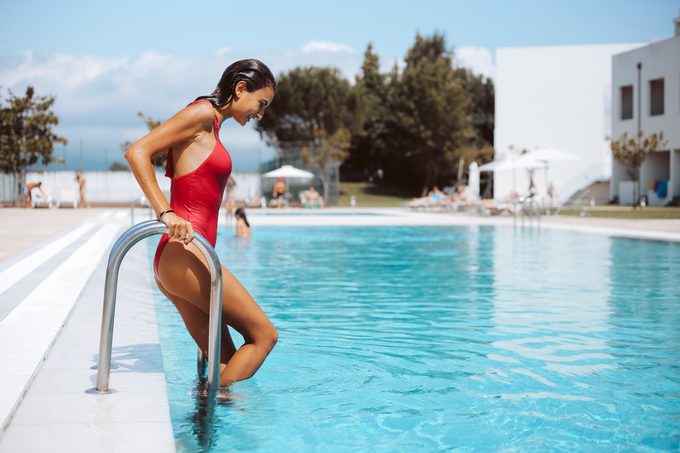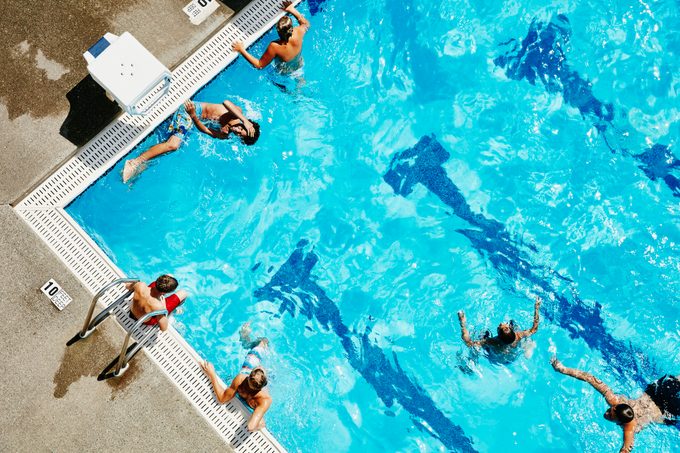Can You Catch Coronavirus From Swimming?
Updated: Jun. 03, 2020
Pools, beaches, and lakes are starting to open. Here's what you need to know to stay safe from coronavirus and Covid-19 when swimming.
As far as health experts know, the novel coronavirus doesn’t spread through water in pools, hot tubs, or water playgrounds, according to the Centers for Disease Control and Prevention. But that doesn’t mean there aren’t potential risks.
Remember, there’s still a lot we don’t know about Covid-19. (Here are tips on how to avoid Covid-19.) This is what experts have to say about swimming in pools, lakes, and the ocean and your risk of catching coronavirus.
Pool chemicals should kill the virus
Typically, viruses do not survive in water treated with pool chemicals. “At this time,” says Robert Glatter, MD, an emergency physician with Lenox Hill Hospital in New York City, “there is no evidence that SARS-CoV-2 can be transmitted to persons via water in pools, hot tubs, or spas,” he said, referring to the virus by its full medical name. “Standard disinfection using chlorine or bromine will kill the virus in water.”
But given the continuing pandemic, it’s now doubly important to make sure that any pool (or spa or hot tub) you’re using is being maintained properly. (Here are signs that a public pool is too dirty to swim in.)

What about lakes and oceans?
Covid-19 does not seem to spread in this type of water either. “Most things find it more difficult to live in salt water,” says Katherine Baumgarten, MD, medical director of infection control and prevention at Ochsner Health System in New Orleans. “It’s just making sure the salt is in high enough levels.”
The one potential problem could be where seawater mixes with wastewater that is contaminated with the virus, says Dr. Glatter, but even this is highly improbable. So far, says Dr. Glatter, research suggests that Covid-19 does not spread through feces. And even though researchers have found the virus in sewage, there’s no evidence this is a mode of transmission either. On the other hand, you wouldn’t want to be swimming near wastewater for any number of health reasons.
The real risk when it comes to Covid-19 and swimming
The real concern about swimming and Covid-19 has to do with being in close contact with other people in the same environment. “It’s not so much about the water but the surroundings of the water,” says Dr. Baumgarten.
This could be in the pool (swimming, horsing around) or outside the water on the beach, on the lakeshore, on the patio. Crowds gathering at pools and other waterfront areas—like the mega-pool party in the Ozarks— could spark additional outbreaks, experts worry. Guests who attended that event over Memorial Day weekend were asked to self-quarantine for two weeks or until they got a negative Covid-19 test. Don’t let your guard down. You want to follow the same social-distancing guidelines recommended by the CDC here as you would anywhere else.
“The virus is more likely to be spread by droplets or aerosols from speaking, coughing or sneezing, or possibly from direct contact on surfaces,” says Dr. Glatter. “The possibility of transmission via water is much less of a concern overall.”
One other thing to remember: It’s going to be easier to social distance in an outdoor setting than an indoor one.
Avoid high-touch surfaces
Although Covid-19 primarily spreads from person to person, there’s still the chance you could get infected by touching a contaminated surface. In swimming environments, this might include gym and locker room doors, common restrooms, benches, signing in or using a card scanner, says U.S. Masters Swimming, which canceled its Spring National Championship in April.
Then there are diving boards, pool ladders, hand railings. You should also be aware of seating arrangements outside the water. “Make sure those areas are cleaned and disinfected between uses,” says Dr. Baumgarten. And, again, seating areas should be spread apart. (Here’s what you should know about the most dangerous places to swim.)

Don’t share beach or pool toys
Common items like rafts, beach balls and noodles should be cleaned between uses, says Dr. Baumgarten. Make sure you’re not sharing ice chests or food and drink and definitely, definitely don’t let other people use your goggles, nose clips, or snorkel. “Really, you should only have those for individual use,” she advises.
“It’s still vital that people practice good hand hygiene and social distancing while at pools or in hot tubs,” adds Dr. Glatter. “This is critical and may be one factor in spread in these settings if these practices are not emphasized and enforced.
Take hand sanitizer with you when you go to the beach or pool, advises Dr. Baumgarten. And definitely don’t go to any of these places if you have symptoms of Covid-19 (or any other illness) or if you think you’ve been exposed to the virus.
Remember other water risks
The risk of contracting Covid-19 from the water, unless you’re with other people, is low. But even with all the attention going to the pandemic, don’t forget that water recreation poses other risks as well. That includes getting sunburned, drowning, and sustaining an injury.
There’s also a risk that you could get a recreational water illness. These are caused by germs (other than Covid-19) in and around recreational water areas. According to the CDC, the most common, like norovirus, Shigella and E. coli, cause diarrheal illness.
And while being too close to people outside your immediate circle can be dangerous during Covid-19, you should also not swim in open water by yourself.
(Learn about how safe it is to take a walk outside during Covid-19.)
